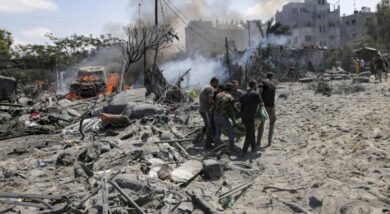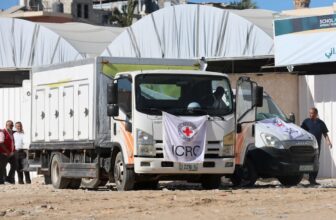UN official: UNRWA is the backbone of Gaza’s humanitarian response
شبكة الخامسة للأنباء - غزة

UNRWA spokesperson Adnan Abu Hasna said the agency is the backbone of humanitarian work inside the Gaza Strip and should lead the response there, noting it has been unable to deliver any of the humanitarian supplies earmarked for Gaza despite several days having passed since the ceasefire came into effect.
According to the UN media centre, Adnan Abu Hasna said excluding the agency from humanitarian efforts in Gaza would mean the collapse of the operation and would also signal a lack of public trust in it, and that UNRWA staff are still carrying out their work despite the difficulties, but they have been prevented by Israel from distributing food aid.
He explained that so far Israel has not allowed UNRWA to bring in the food and non-food supplies contained in six thousand trucks waiting at the gates of the Gaza Strip. These trucks hold food enough for Gaza’s population for three months.
He added that UNRWA has hundreds of thousands of blankets, tents and clothing, as well as large quantities of medicine, and these must be allowed in so the agency can truly address the harsh and dangerous conditions in the Strip, which remain deteriorated. The war has stopped, the shooting has stopped, but unfortunately there are new dimensions to this war — the continuation of suffering.
Adnan Abu Hasna confirmed the agency has 12,000 staff currently working inside the Gaza Strip, including 8,000 teachers. They are working on a plan UNRWA developed with partners on how to restore and re-engage 640,000 students who have been completely excluded from the education process for two years now.
Operations also continue in the health sector. The number of medical visits to UNRWA clinics since 7 October 2023 has now exceeded ten million. Solid waste collection is ongoing. Supplying shelters and establishing wells inside the camps continues.
He noted that psychosocial support operations have not stopped either. Around 800,000 psychosocial consultations have been provided through UNRWA. All operations are continuing, but the one thing we are not doing is distributing food because Israel has prevented us from doing so.
Adnan Abu Hasna said roughly 90 percent of the agency’s facilities have been destroyed or severely damaged. Overall conditions in the Gaza Strip are perilous. Israel still controls 53% of the territory. There is severe overcrowding. Roads are clogged with rubble, making movement difficult. The Strip needs many things because life in Gaza has effectively been crushed.
He stressed that if there is to be an effective and genuine humanitarian response, UNRWA must lead that response. Excluding UNRWA would mean the collapse of the operation and would also undermine public trust. People in Gaza view UNRWA as having no security or political agenda. UNRWA is a humanitarian organisation implementing a mandate from the UN General Assembly related to services and the rights of Palestinian refugees.
Adnan Abu Hasna said virtually all countries support UNRWA; only the United States has cut funding to the agency, along with Sweden. Arab states provided $190 million to UNRWA last year, but this year they have given only $14 million. Therefore, we need Arab support so UNRWA can continue its services not only in Gaza but also in the West Bank, including Jerusalem.
The UN official said everyone wants UNRWA to remain and continue because, in the view of the vast majority of the international community, it is also an element of regional stability and not just a service provider. Everyone therefore has an interest in this role, and the UNRWA Commissioner-General is conducting contacts with multiple parties to secure the entry of aid and to allow its international staff to enter the Gaza Strip.






